Touch Tank
2022

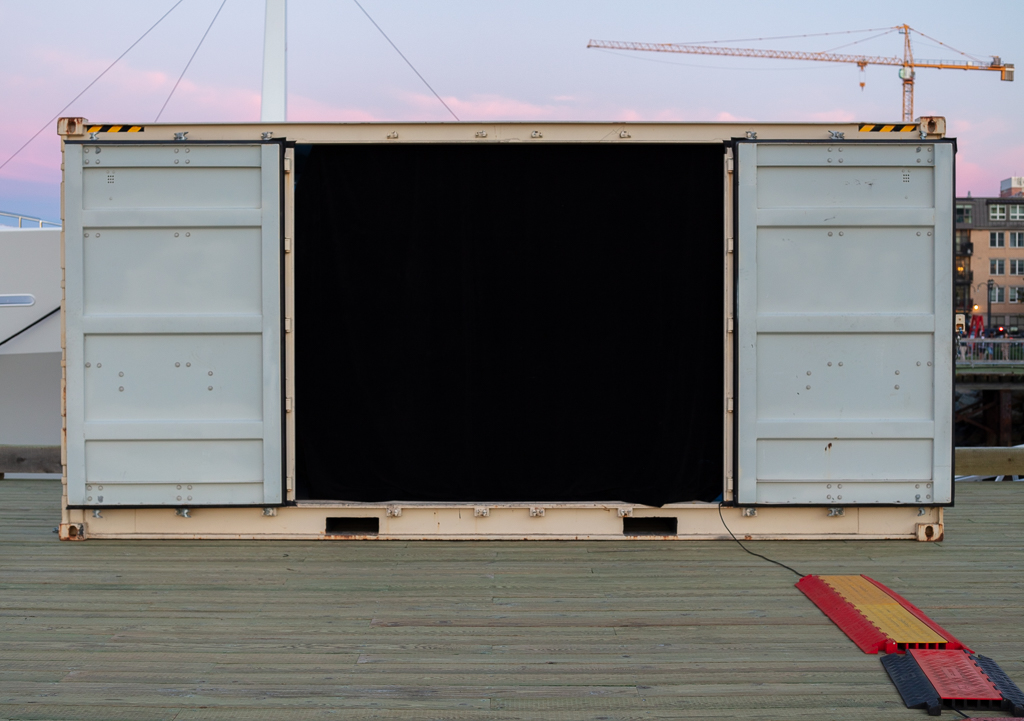
research + virtual reality + painting + video projection + haptic audio-visual design
Touch Tank is a mixed reality installation that includes a virtual reality environment viewable through a VR headset, projection-mapped videos, and an interactive audio-visual controller made from a fish tank, water, and an arduino-based capactive touch sensor.
The work invites audiences to wander within the complexities and manifold possibilities of human and non-human interaction. Reimagining empirical experiences of Nova Scotia’s coastal intertidal zones, Touch Tank explores embodied notions of looking, touching, sensing, and remembering to propose an experiential digital framework for ruminating on the interconnections of painted, virtual, and touristic simulations of landscape.
The creation of panoramic landscape paintings is considered one the earliest attempts to achieve “virtual reality”. These paintings, called cycloramas, immerse viewers in a scene by using props, large curved support surfaces and painting techniques that simulate a sense of depth between background and foreground. Modern day panoramas exist as documentations of historical landscapes at museums and heritage sites, ranging from war reenactments to natural history dioramas. The grandiose nature of these cycloramas engage ideas of the sublime, spectacle, staged realism, and world-building, tools which have historically been used in art and history to establish problematic idealizations of nature.
In a contemporary context, the tourism industry relies heavily on these artistic tropes to engage audiences in regional discourses surrounding settler histories, environmentalism and ecology, with the aim of reconnecting visitors to their natural surroundings. Growing up near the Bay of Fundy in Saint John, New Brunswick, I spent summer holidays with my family touring the Maritimes: going to national parks, museums, and interpretive centers. Reflecting on this, I am now critical of the way these sightseeing experiences objectify nature to attract visitors and often reinforce boundaries between what is perceived as "natural" and what constitutes "human" or "cultural" space.
This project uses the touch tank tourist experience to dissect these ideas. While visibly lacking key features of the panorama, the touch tank is a variation on the theme of world-building where the tank itself acts as a staged adaptation of intertidal ecosystems. Expanding on this concept, the work invites viewers to engage sensuously with the installation to think critically about the spectacle of touch.
Touch Tank was developed through intensive research and experimentation on translating my practice in landscape painting into virtual reality. Using techniques such as photogrammetry, or the process of taking overlapping photographs of an object to create 3D digital models, the virtual reality operates as an abstracted panorama of Nova Scotia's coastal environment. Based on data collected from site visits to local beaches, including photographs, 3D scans, audio recordings, videos, and plein air paintings, I combined 3D models with oil painted textures taken from paintings of the same objects, sites, and places to produce a transmogrified 3D landscape.
In the installation, the audience can watch a randomly shifting landscape reconfigure itself in real-time at two stations -- (1) an interactive touch tank with built-in capactive touch sensors and (2) a VR headset. While using headphones to listen to the accompanting soundscape made from layered virtual synths and field recordings, viewers can touch the tank and the water in various ways to activate capacitive touch sensors, thus affecting the appearance of the virtual landsape. They can then put on a VR head-mounted display to explore the shifting landscape in 360 degrees, experiencing effects caused by those simultaneously interacting with the tank.
This project was developed over two years in co-production with Centre for Art Tapes and Ada X through their artist residency programs. “Touch Tank” has been exhibited at Halifax Independent Filmmakers Festival, presented on the Halifax Waterfront, in conjunction with Develop NS, June 9-12, 2022 and at Radiant Rural Halls through This Town is Small, hosted at the Kings Playhouse in Georgetown PEI, March 4-5, 2023.
The work invites audiences to wander within the complexities and manifold possibilities of human and non-human interaction. Reimagining empirical experiences of Nova Scotia’s coastal intertidal zones, Touch Tank explores embodied notions of looking, touching, sensing, and remembering to propose an experiential digital framework for ruminating on the interconnections of painted, virtual, and touristic simulations of landscape.
The creation of panoramic landscape paintings is considered one the earliest attempts to achieve “virtual reality”. These paintings, called cycloramas, immerse viewers in a scene by using props, large curved support surfaces and painting techniques that simulate a sense of depth between background and foreground. Modern day panoramas exist as documentations of historical landscapes at museums and heritage sites, ranging from war reenactments to natural history dioramas. The grandiose nature of these cycloramas engage ideas of the sublime, spectacle, staged realism, and world-building, tools which have historically been used in art and history to establish problematic idealizations of nature.
In a contemporary context, the tourism industry relies heavily on these artistic tropes to engage audiences in regional discourses surrounding settler histories, environmentalism and ecology, with the aim of reconnecting visitors to their natural surroundings. Growing up near the Bay of Fundy in Saint John, New Brunswick, I spent summer holidays with my family touring the Maritimes: going to national parks, museums, and interpretive centers. Reflecting on this, I am now critical of the way these sightseeing experiences objectify nature to attract visitors and often reinforce boundaries between what is perceived as "natural" and what constitutes "human" or "cultural" space.
This project uses the touch tank tourist experience to dissect these ideas. While visibly lacking key features of the panorama, the touch tank is a variation on the theme of world-building where the tank itself acts as a staged adaptation of intertidal ecosystems. Expanding on this concept, the work invites viewers to engage sensuously with the installation to think critically about the spectacle of touch.
Touch Tank was developed through intensive research and experimentation on translating my practice in landscape painting into virtual reality. Using techniques such as photogrammetry, or the process of taking overlapping photographs of an object to create 3D digital models, the virtual reality operates as an abstracted panorama of Nova Scotia's coastal environment. Based on data collected from site visits to local beaches, including photographs, 3D scans, audio recordings, videos, and plein air paintings, I combined 3D models with oil painted textures taken from paintings of the same objects, sites, and places to produce a transmogrified 3D landscape.
In the installation, the audience can watch a randomly shifting landscape reconfigure itself in real-time at two stations -- (1) an interactive touch tank with built-in capactive touch sensors and (2) a VR headset. While using headphones to listen to the accompanting soundscape made from layered virtual synths and field recordings, viewers can touch the tank and the water in various ways to activate capacitive touch sensors, thus affecting the appearance of the virtual landsape. They can then put on a VR head-mounted display to explore the shifting landscape in 360 degrees, experiencing effects caused by those simultaneously interacting with the tank.
This project was developed over two years in co-production with Centre for Art Tapes and Ada X through their artist residency programs. “Touch Tank” has been exhibited at Halifax Independent Filmmakers Festival, presented on the Halifax Waterfront, in conjunction with Develop NS, June 9-12, 2022 and at Radiant Rural Halls through This Town is Small, hosted at the Kings Playhouse in Georgetown PEI, March 4-5, 2023.
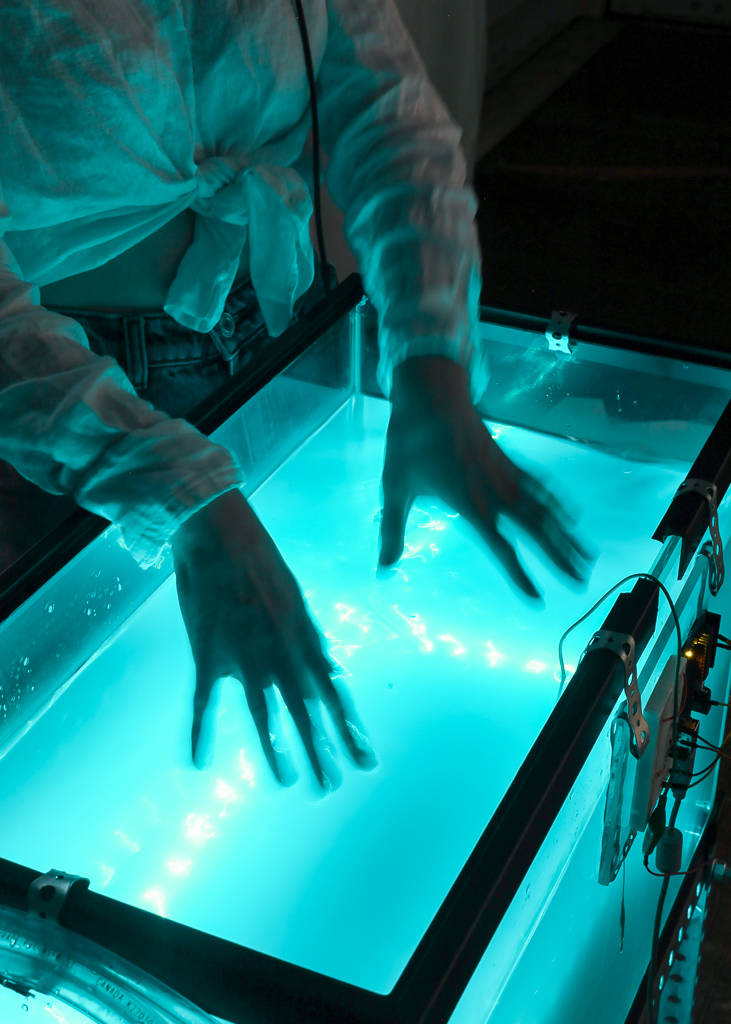

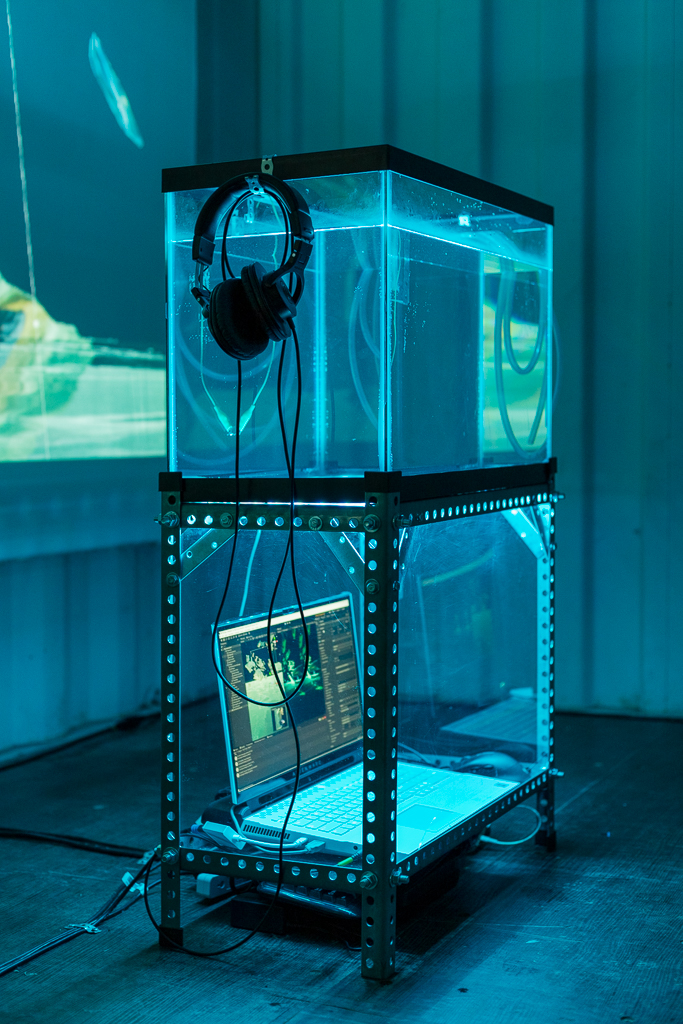
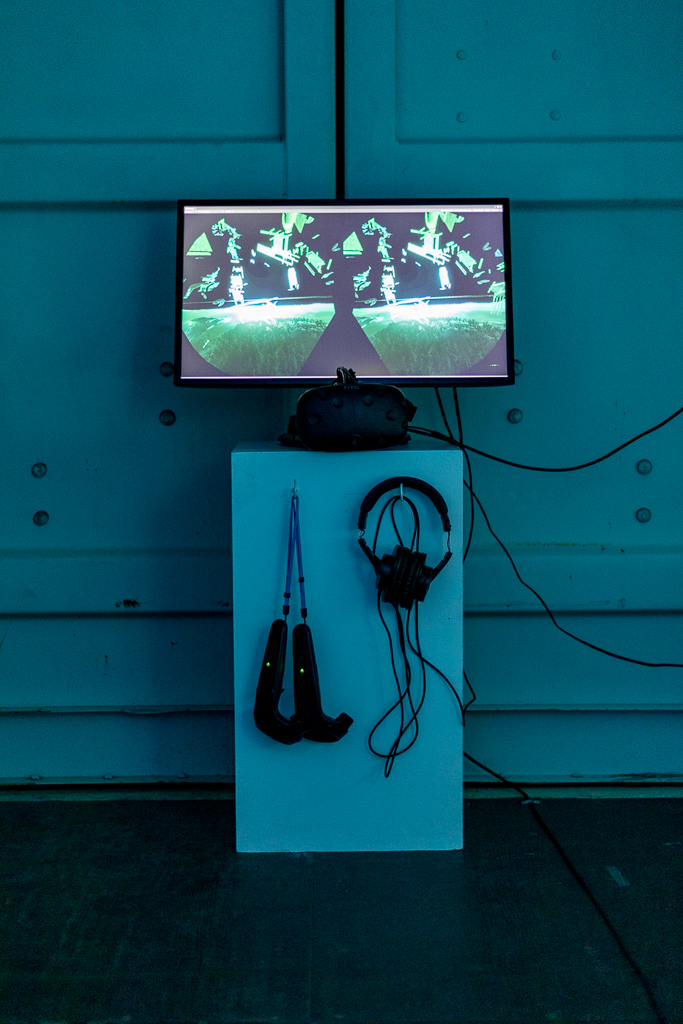
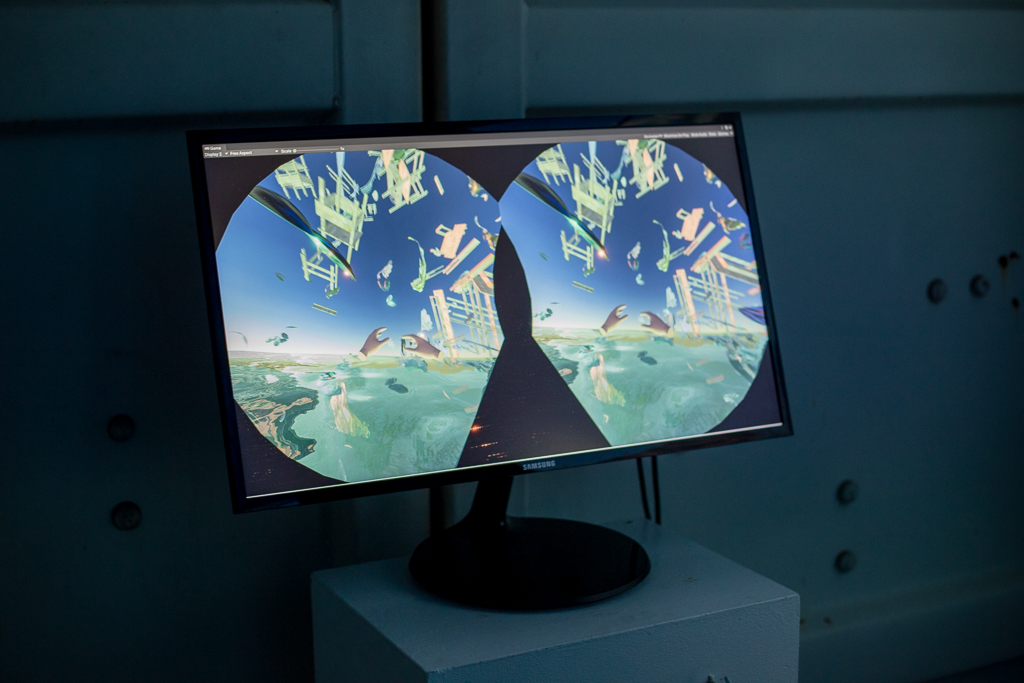
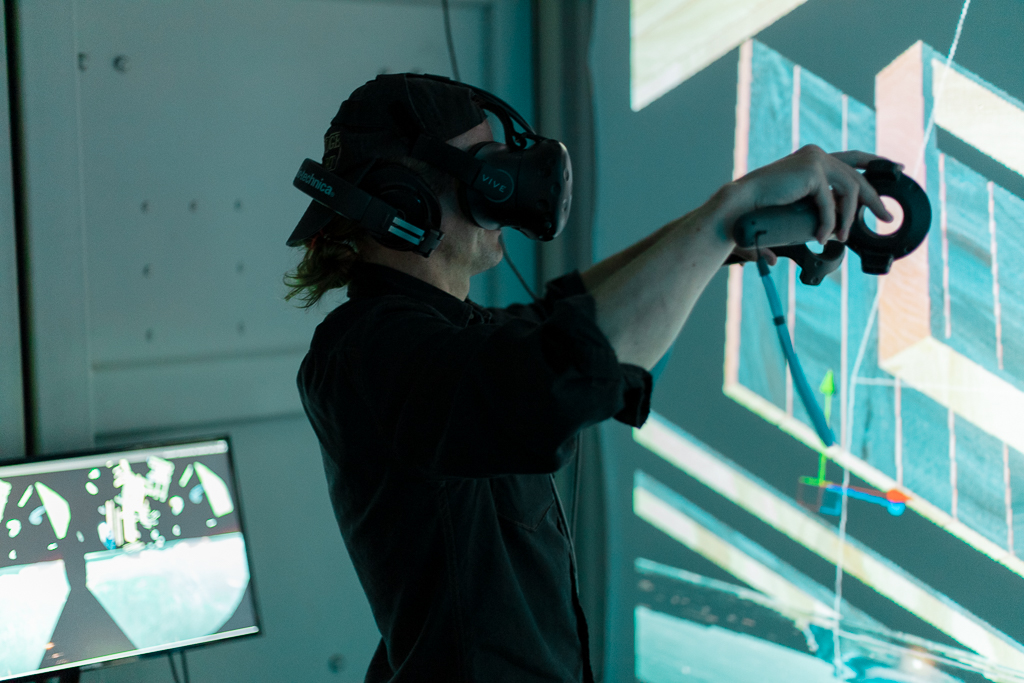


︎
︎
︎
︎